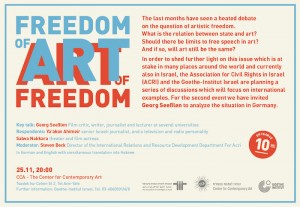This week I gave a lecture at Shenkar College on the freedom of artistic expression. As I stood before dozens of students, I wanted to convey a clear message: There is no legal basis for your artistic freedom to be restricted in any way, as long as your work does not incite violence or racism.
I must admit that my heart was aching on my way home. The fact that the freedom of artistic expression is not clear, that the creative freedom of artists has been constantly questioned in recent months and that students at the beginning of their artistic careers are asking questions about censorship, presents real problems for all of us in a democratic society.
This year ACRI has done a lot of work in relation to the freedom of artistic expression. Unfortunately the formation of the government marked a new attempt to restrict the freedom of political expression in works of art and culture. Not long ago I told you about our petition to the Attorney General after Miri Regev, the Minister of Culture and Sport, attempted several times to deny budgetary support to cultural institutions, due to the content of their movies and shows.
In response, the Deputy Attorney General made it clear that the Minister of Culture and Sport does not have authority to consider the content of the artwork when deciding whether to allocate funding, and that consideration should be given to artistic and professional factors only.
ACRI has also responded to recent restrictions on the freedom of political and cultural expression by local authorities. For example, some municipalities succumbed to political pressures and prevented the screening of “Shaking in Gaza”, a film which addresses the emotional difficulties encountered by residents in Gaza after Operation Protective Edge. The Deputy Attorney General agreed with our position that the reasons given by the municipality – such as the need to prohibit political activities in municipal spaces, which are provided free of charge, because of fear of hurting feelings and causing public disturbances – do not justify the film not being screened.
These decisions, made by ministers and municipal leaders, severely harm the freedom of expression and democracy. They impact on cultural institutions, which may lead to self-censorship of artists, and influence the decisions of funding bodies with respect to culture and art. And here I return to the students of Shenkar: The students made me realise that these decisions are beginning to permeate and influence the hearts and minds of our future artists.
The limits on the freedom of artistic expression is an issue that is being discussed all over the world. This Wednesday, together with the Goethe Institute, we are holding a conference on the freedom of expression in Israel, in comparison with Germany. Georg Seeßlen, a film critic, journalist and lecturer will discuss the situation in Germany. We would love to see you at the conference. I believe that the attempt to impose censorship on culture and stifle art is an important discussion to have, as it challenges conventions and provides us all with food for thought.
Lastly, I want to thank all of you who responded to our newsletter last week and sent emails to members of the Constitution, Law and Justice Committee. Together, we were able to delay the decision about the discriminatory and harmful “Stop and Frisk Bill.” We are continuing to work against the bill in order to remove it completely from the government’s agenda.
Yours,
Sharon Abraham-Weiss
Executive Director
Association for Civil Rights in Israel









